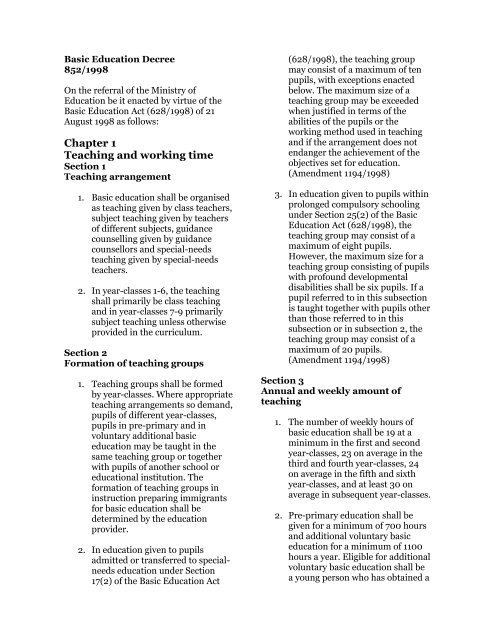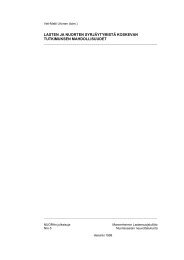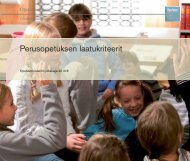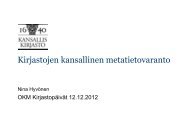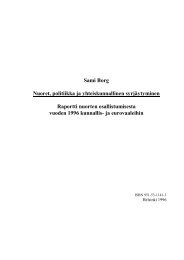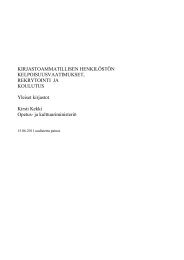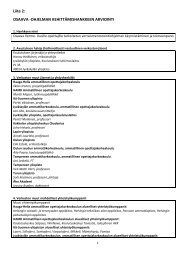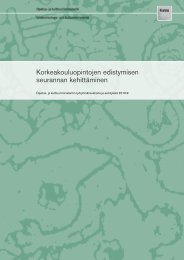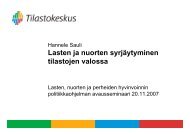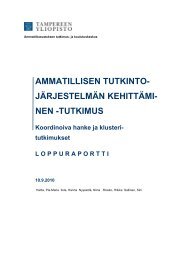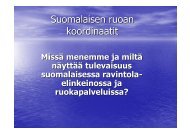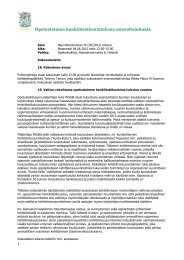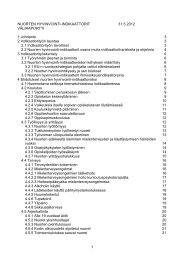Basic Education Decree
Basic Education Decree
Basic Education Decree
You also want an ePaper? Increase the reach of your titles
YUMPU automatically turns print PDFs into web optimized ePapers that Google loves.
<strong>Basic</strong> <strong>Education</strong> <strong>Decree</strong>852/1998On the referral of the Ministry of<strong>Education</strong> be it enacted by virtue of the<strong>Basic</strong> <strong>Education</strong> Act (628/1998) of 21August 1998 as follows:Chapter 1Teaching and working timeSection 1Teaching arrangement1. <strong>Basic</strong> education shall be organisedas teaching given by class teachers,subject teaching given by teachersof different subjects, guidancecounselling given by guidancecounsellors and special-needsteaching given by special-needsteachers.2. In year-classes 1-6, the teachingshall primarily be class teachingand in year-classes 7-9 primarilysubject teaching unless otherwiseprovided in the curriculum.Section 2Formation of teaching groups1. Teaching groups shall be formedby year-classes. Where appropriateteaching arrangements so demand,pupils of different year-classes,pupils in pre-primary and involuntary additional basiceducation may be taught in thesame teaching group or togetherwith pupils of another school oreducational institution. Theformation of teaching groups ininstruction preparing immigrantsfor basic education shall bedetermined by the educationprovider.2. In education given to pupilsadmitted or transferred to specialneedseducation under Section17(2) of the <strong>Basic</strong> <strong>Education</strong> Act(628/1998), the teaching groupmay consist of a maximum of tenpupils, with exceptions enactedbelow. The maximum size of ateaching group may be exceededwhen justified in terms of theabilities of the pupils or theworking method used in teachingand if the arrangement does notendanger the achievement of theobjectives set for education.(Amendment 1194/1998)3. In education given to pupils withinprolonged compulsory schoolingunder Section 25(2) of the <strong>Basic</strong><strong>Education</strong> Act (628/1998), theteaching group may consist of amaximum of eight pupils.However, the maximum size for ateaching group consisting of pupilswith profound developmentaldisabilities shall be six pupils. If apupil referred to in this subsectionis taught together with pupils otherthan those referred to in thissubsection or in subsection 2, theteaching group may consist of amaximum of 20 pupils.(Amendment 1194/1998)Section 3Annual and weekly amount ofteaching1. The number of weekly hours ofbasic education shall be 19 at aminimum in the first and secondyear-classes, 23 on average in thethird and fourth year-classes, 24on average in the fifth and sixthyear-classes, and at least 30 onaverage in subsequent year-classes.2. Pre-primary education shall begiven for a minimum of 700 hoursand additional voluntary basiceducation for a minimum of 1100hours a year. Eligible for additionalvoluntary basic education shall bea young person who has obtained a
Translation 04/11/03 2school-leaving certificate in thesame or previous year.3. The extent of instruction preparingimmigrants for basic educationshall be 450 hours at a minimumfor pupils aged between 6 and 10and a minimum of 500 hours forpupils older than this. A pupilparticipating in this educationshall have the right to transfer tobasic education before completingthe number of hours referred toabove if he or she is able to followteaching in basic education.4. The duration of teaching per onehour shall be 45 minutes at aminimum. The time allocated toteaching shall be divided intoappropriate teaching periods.5. Part of the working time may beused for familiarisation with theworld of work and for the closingceremony and other schoolfunctions.Section 4Daily work load1. In pre-primary education and inthe two first year-classes of basiceducation, the pupil's working daymay comprise a maximum of fivelesson hours and in other yearclassesand in voluntary additionalbasic education a maximum ofseven lesson hours.2. Where appropriate teachingarrangements so require, thepupil's working day in the seventh,eight and ninth year-classes maytemporarily exceed the extentdecreed in subsection 1.3. Foreign-language teaching referredto in Section 10(4) of the <strong>Basic</strong><strong>Education</strong> Act and educationorganised abroad may deviatefrom the provisions of this Sectionas laid down in the authorisationto provide education.Section 5Arrangement of substitutingeducation1. A pupil who is not taught religiouseducation or ethics under Section13 of the <strong>Basic</strong> <strong>Education</strong> Act orwho is otherwise exempted fromstudying a subject under Section 18of the <strong>Basic</strong> <strong>Education</strong> Act otherthan temporarily shall be providedother instruction or guided activityin substitution.2. A pupil who takes part inextracurricular religious educationaccording to his or her own faith orwho can otherwise be consideredto have knowledge and skillscorresponding to the basiceducation syllabus may beexempted from teaching or guidedactivity referred to in subsection 1.The extent of teaching given to thepupil may in this case be smallerthan that enacted in Section 3.(Amendment 560/2003)Section 6Morning assembly1. The school day shall start with ashort morning assembly.Section 7End of school1. The work of the school year shallterminate on the last weekday ofweek 22. If lost working days needto be replaced under Section 23 ofthe <strong>Basic</strong> <strong>Education</strong> Act, the schoolyear shall end on the datedetermined by the educationprovider.
Translation 04/11/03 32. In education provided abroad andin education in which themandatory number referred to inSection 23(1) of the <strong>Basic</strong><strong>Education</strong> Act is exceeded on thebasis of on the authorisationgranted by the competent Ministryunder said Section, the closing dayshall be decided by the educationprovider.Section 8<strong>Education</strong> of persons other thanthose of compulsory school age1. In basic education provided forpersons other than those ofcompulsory school age, theteaching of different subjects shallbe organised into courses of 28hours on average. Free-choicecourses may be shorter or longerthan 28 hours. The minimumextent of the basic educationsyllabus shall be 44 courses.However, in education provided inprisons, the minimum extent of thesyllabus shall be 30 courses.2. In contact teaching, a minimum of40 minutes of each lesson hourshall be dedicated to teaching.. Thetime allocated to teaching shall bedivided into appropriate teachingperiods.3. Matters other than those enactedin this Chapter shall be decided bythe education provider.Section 9Planning of teaching and teachingtime1. The education provider shall drawup a plan for each school yearbased on the curriculum which willset down overall teachingarrangements, lesson hours andother activities to be organised inconjunction with teaching, andworking hours, extramuralteaching and other necessarymatters relating to teaching.2. The education provider shall notifypupils and their parents/carersabout pivotal matters referred to insubsection 1.Chapter 2Pupil assessmentSection 10Continuous pupil assessment1. Information about a pupil'sprogress in learning and his or herwork and behaviour must beprovided sufficiently often for thepupil and his or her parent/carer.The procedures for disseminatinginformation shall be laid down inmore detail in the curriculum.2. At the end of each school year, thepupil shall have a report cardindicating the pupil's studyprogramme and an assessment,either by subjects or subjectgroups, of how the pupil hasachieved the set objectives and anappraisal of the pupil's behaviour.The National Board of <strong>Education</strong>shall determine what subjects canbe assessed as a group.3. The assessment referred to insubsection 2 above shall benumerical or verbal. The scale ofmarking is 4–10. Grade 5 denotespoor, 6 fair, 7 average, 8 good, 9very good and 10 excellentknowledge and skills. The grade forfail is 4. Verbal assessment may beused, unless otherwise ordained bythe National Board of <strong>Education</strong>:(1) in assessments in year-classes1–7;(2) in the assessment of optionalsubjects or subject groups;
Translation 04/11/03 4(3) in the assessment of pupilswithin prolonged compulsoryschooling referred to in Section25(2) of the <strong>Basic</strong> <strong>Education</strong> Act;(4) in the assessment of pupilswhose mother tongue, barringFinnish and Swedish, is other thanthe language of instruction, exceptin the final assessment; and(5) always in addition to numericalmarking.Section 11Progress in studies andadvancement1. A pupil who has attained a gradeindicating at least poor knowledgeand skills or a correspondingverbal assessment in differentsubjects included in his or hersyllabus shall be transferred to thenext year-class at the end of theschool year. A pupil whoseperformance has been rated as failshall be given a chance todemonstrate that he or she hasachieved passable knowledge andskills in the subject concernedwithout participating in teaching.Such an opportunity may also begiven after the school year hasended.2. A pupil can be made to repeat ayear-class if he or she has notpassed, during schoolwork or in aseparate examination, differentsubjects referred to in subsection 1or if the pupil's overall schoolattainment can be considered towarrant it. The National Board of<strong>Education</strong> may ordain the caseswhen a fail in some subject will notcause the repeating of a year-class.The attainments of the year-classwhich the student is made torepeat will become void.3. In the curriculum it may be laiddown that it is possible for a pupilto advance in different subjects inaccordance with his or her ownstudy plan instead of year-classsyllabi. The curriculum shalldetermine the study moduleswhich must be passed in order toprogress in the subject concerned.After the work of a school year hasended the pupil goes on to the nextyear-class. In the ninth year-classthe pupil is considered to be in thatyear-class until he or she isawarded the school-leavingcertificate or resigns. Thepossibility of taking a separateexamination to pass a studymodule precluding progress andthe repeating of a year-classbecause of poor overall studyattainment shall come under theprovisions of subsections 1 and 2.Section 12Final assessment, certificate ofresignation and studies in one orseveral subject syllabi1. A pupil who has successfullycompleted the whole basiceducation syllabus shall beawarded a school-leavingcertificate. A pupil who leavesschool without completing thewhole basic education syllabusshall be awarded a certificate ofresignation. A person who hascompleted the syllabus of one orseveral subjects referred to inSection 46(2) of the <strong>Basic</strong><strong>Education</strong> Act shall be awarded acertificate for the completion of asubject syllabus.2. The school-leaving certificate, thecertificate of resignation and thecertificate referred to in Section46(2) of the <strong>Basic</strong> <strong>Education</strong> Actshall come under the provisions ofSection 10 above. No mark for thebehaviour of the pupil shall not,however, be recorded.
Translation 04/11/03 5Section 13Assessor and notification of criteria1. Pupil assessment shall be made byhis or her teacher as regards eachsubject or study module, or if thereare several teachers, by theteachers together. Behaviour isappraised by the pupil's teacher, orif there are several teachers, theteachers together. The repeating ofa year-class shall be decided by theprincipal and the pupil's teacherstogether.2. The pupil and his or herparent/carer are entitled to receiveinformation about assessmentcriteria and their application topupil assessment.14 SectionAssessment in certain cases1. In voluntary additional basiceducation, in teaching by themedium of a foreign languagereferred to in Section 10(4), ineducation provided abroad and ineducation provided for personsother than those of compulsoryschool age, assessment maydeviate from the provisions of thisChapter as ordained by theNational Board of <strong>Education</strong>.2. Assessment in pre-primaryeducation and in instructionpreparing immigrants for basiceducation shall be set down in thecurriculum.Chapter 3Pupil's legal rightsSections 15-17Sections 15-17 have been repealed by Act560/2003.18 SectionPrincipal's and teacher's decisionpower in certain situations(Amendment 560/2003)1. Detention referred to in Section36(1) of the <strong>Basic</strong> <strong>Education</strong> Act,dismissal from the classroom orother teaching facility referred toin Section 36(2) and an order tocomplete assignments after schoolreferred to in Section 36(4) shallbe decided by the pupil's teacher.An order to leave a school functionreferred to in Section 36(2) shallbe decided by the principal or ateacher. A decision to denyparticipation in education referredto in Section 36(3) shall be decidedby the principal.Section 19Re-assessment and rectification ofassessment(Amendment 560/2003)1. A request for to review a decisionconcerning advancement in studiesor the repeating of a year-class orrevision of a final assessment shallbe submitted within two months ofthe receipt of the information. Thereassessment shall be made by theprincipal and the pupil's teacherstogether.2. Where a reassessment or adecision to deny the request ismanifestly unsound, the provincialstate office may, at the request ofthe pupil's parent/carer, instructthe teacher to make a reassessmentor prescribe an appropriate gradefor the pupil or order that thedecision concerning progress instudies or the repeating of a yearclassbe reviewed.Chapter 4Miscellaneous provisions
Translation 04/11/03 6Section 20Authorisation to provide education1. The authorisation to provideeducation referred to in Sections 5and 7 of the <strong>Basic</strong> <strong>Education</strong> Actmust be applied at least one yearbefore the plannedcommencement of education. Thecompetent Ministry may alsoaccept to process an applicationsubmitted later than the said time,if necessary. The application shallbe submitted to the provincial stateoffice.2. The application for authorisationshall include an account of theneed for the education and thefulfilment of the other conditionsfor authorisation.Section 21Full board relating toaccommodation1. The full board provided inaccommodation includes free foodand cleaning.Section 2Student teachers1. <strong>Basic</strong> education may also be givenby teacher trainees under thesupervision of a teacher.Section 23Separate examinations1. A separate examination referred toin Section 38 of the <strong>Basic</strong><strong>Education</strong> Act may be set by aneducation provider authorised toprovide basic education.2. A person taking a separateexamination must demonstratethat his or her knowledge andskills correspond to the knowledgeand skills required for differentsubjects in the basic educationsyllabus. In order to complete thewhole basic education syllabus, apupil of compulsory school agemust take an examination in all thesubjects referred to in Section 11(1)of the <strong>Basic</strong> <strong>Education</strong> Act andstudents other than those ofcompulsory school age must takeexaminations in mother tongueand literature, the second domesticlanguage, a foreign language,history, civics, mathematics,physics, chemistry, biology andgeography.3. A person who has successfullypassed a separate examinationshall be awarded a certificate of thecompletion of the basic educationsyllabus in full or in part.4. The assessment of a separateexamination and appeals againstassessment shall come underSections 10, 11 and 19, whereapplicable.Section 23 aApplication to pre-primaryeducation(Amendment 326/2000)1. Application to pre-primaryeducation shall be submitted asdetermined by the educationprovider. The education providershall notify in advance where theeducation is provided, when theeducation starts and ends and howto apply for pre-primary educationprovided or purchased by it.2. It is also possible to apply for preprimaryeducation in a placeproviding pre-primary educationother than the one assigned by thelocal authority by virtue of Section6(2) of the <strong>Basic</strong> <strong>Education</strong> Act.Equal selection criteria shall be
Translation 04/11/03 7applied in the admission of thesepupils. The local authority may,however, decide to admit primarilychildren residing in themunicipality to pre-primaryeducation arranged or purchasedby it.3. When the child's place of residenceor the work or study situation ofthe parent/carer changes, or forsome other corresponding specialreason, it is possible to submit theapplication to pre-primaryeducation later than stipulated bythe education provider undersubsection 1.Chapter 5Coming into force and transitionalprovisionsSection 24Coming into force1. This <strong>Decree</strong> shall come into forceon the first of January 1999.2. Measures necessary for theimplementation of this Act may beundertaken before its entry intoforce.Section 25Transitional provisions on thenumber of lesson hours in preprimaryeducation and voluntaryadditional basic education and thearrangement of substitutingeducation1. The provisions in Section 3(2)concerning the minimum numberof lesson hours in pre-primaryeducation and in voluntaryadditional basic education shall beapplied as from the beginning ofthe school year 1999–2000. Untilthen they shall come under theprovisions in force at the cominginto force of this <strong>Decree</strong>.2. If a pupil has been exempted fromsome subject other thantemporarily before this <strong>Decree</strong>comes into force, the arrangementof substituting education shallcome under the provisions in forceat the coming into force of this<strong>Decree</strong> instead of Section 5.Section 26Transitional provision concerningpupil assessment1. The provisions of Sections 10-12concerning pupil assessment shallbe applied as from the beginning ofschool year 1999–2000. Until thenpupil assessment shall come underthe provisions in force at thecoming into force of this <strong>Decree</strong>and regulations and decisionsissued by virtue thereof.2. In report cards given in the schoolyear 1998–1999, designationseffective at the coming into force ofthis <strong>Decree</strong> may be used formother tongue and literature,crafts, and art.Section 27Transitional provision concerningretirement age in certain civilservice posts1. The retirement age of theprincipal, deputy principal, thedirector of the pupil residence anda teacher at a school for personswith auditory and visualimpairments, and the director,deputy director and teacher of areform school, whose pensionentitlement comes under theprovisions of Section 2 of the CivilService Pensions Act (611/1966),shall be determined in accordancewith the said provision as long ashe or she works in a correspondingpost in a state educational
Translation 04/11/03 8institution referred to in the <strong>Basic</strong><strong>Education</strong> Act.


